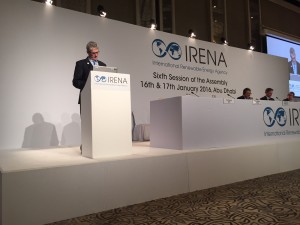Statement by H.E. Mr Mogens Lykketoft, President of the 70th session of the General Assembly at Sixth International Renewable Energy Agency Assembly
17 January 2016
Honourable Ministers, Excellencies, ladies and gentlemen, it is my great pleasure to address this Sixth IRENA assembly.
I do so at a time of great hope for our world.
Despite painful images of war, violence, deprivation and humanitarian crisis, 2015 was a year of major breakthroughs.
A year when political leaders supported by scientists, civil society, technologists and progressive business actors, came together to address some of the greatest global challenges that we share.
With the agreement of the Addis Ababa Action Agenda on Financing for Development; the 2030 Agenda for Sustainable Development and the Paris Climate Agreement, as well as the Sendai Framework on Disaster Risk Reduction, they sent a message to all people that our world is embarking on a process of major transformation.
Through these agreements, world leaders have signalled that the time to end poverty and to invest in peaceful and just societies, powered by inclusive, low-carbon and climate-resilient economies, is now.
But if 2015 was a year of negotiation, then 2016 must be the year of implementation.
This will not be easy and without rapid progress this year, there is a real risk that the grand plans of 2015 will fall by the way-side.
Collectively, therefore, we must ensure that these agreements gain traction where it matters most:
In the minds of politicians and the laws, rules, policies and budgets of national, regional and local governments;
In the board room and core business practices of big and small companies alike;
In the incentives and behaviour of the international finance industry;
In the policies and operations of international organizations including the United Nations;
In the research strategies of large foundations, academic institutions and others.
And in the demands of global civil society, the aspirations of ordinary citizens and the imagination of the next Edison, Bell or Jobs.
___________
Members of IRENA and those working on renewable energy more broadly have a critical role to play in driving this transformation.
In Sustainable Development Goal 7, we now have a universal goal on energy with specific targets on access, renewables, efficiency, and related means of implementation, around which all actors must rally.
More broadly, increasing access to renewable energy will be fundamental to achieving sustainable development progress across the entire 17 goals.
But make no mistake, the task ahead is immense.
As I speak now, there are still 1.1 billion people who don’t have access to electricity.
Nearly 3 billion people who have no clean cooking facilities.
Global average temperatures are reaching new heights, year on year.
And fossil fuels continue to account for over 80% of global CO2 emissions.
And while there have been notable advances in recent years – in expanding electricity access; in improving primary energy intensity and, thanks to declining technology costs, in increasing the share of renewable energy in global final energy consumption to 19% – the pace of these advances will not allow us to meet our targets.
What therefore can be done to accelerate the positive changes that are already taking place?
First, adequate financing is key to sustainable energy development and it is estimated that to meet our targets by 2030, current investment flows of $400 billion a year need to triple.
To do so, it is imperative that all available resources, both public and private are mobilized, supplemented by innovative financing including green bond markets and carbon pricing markets.
It is also crucial that governments make policies to incentivize capitals to flow towards these opportunities.
Second, we must do much more to promote the development, transfer and diffusion of clean energy technology.
This requires a major increase in capacity building for technology innovation and absorption is essential, particularly for the poorest and most vulnerable countries.
And it also requires an enabling environment at all levels to facilitate that transfer.
The Technology Facilitation Mechanism established by the Addis Ababa Action Agenda has great potential in this area.
Ladies and gentlemen, to make this transformation happen, each of us must contribute.
As President of the General Assembly, I will do my utmost to ensure that these issues remain high on the global agenda.
On April 21st, I will convene a high level thematic debate on SDGs and climate change which will run in tandem with the Secretary General’s Climate Agreement signing ceremony on 22nd April.
It will provide all stakeholders with an opportunity to demonstrate what changes they are already making in response to the SDGs.
And it will also provide space for discussion on key issues relating to the implementation of SDGs including financing, technology and data, climate change and partnership.
Energy and infrastructure will be central components of those discussions and I would very much welcome your active your participation in that meeting.
I thank you all for your attention and I wish you a successful Assembly.


